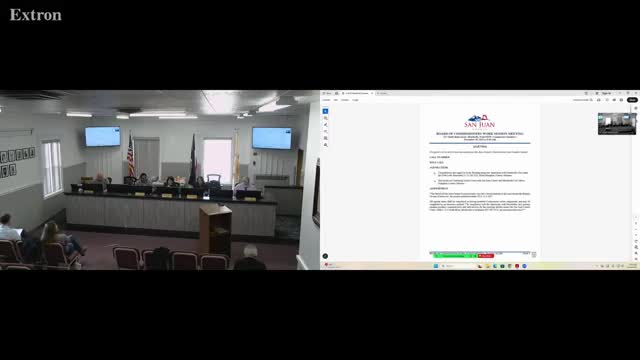Commissioners weigh merging Monticello and San Juan County justice courts; revenue-sharing, data and receiving-center ideas discussed
Get AI-powered insights, summaries, and transcripts
Subscribe
Summary
Monticello City proposed merging its justice court into San Juan County's; commissioners asked for ten-year caseload and financial histories, discussed pilot length (city asked for at least five years) and possible earmarking of fines revenue for a receiving center; staff were directed to prepare options and numbers.
San Juan County commissioners devoted the second half of the Nov. 18 work session to a Monticello City proposal to merge the city's justice court into the San Juan County Justice Court, seeking administrative simplicity and streamlined public interfaces.
The county attorney summarized the mechanics and trade-offs: consolidation would shift responsibilities for prosecution, clerking and equipment to the county and require negotiated allocation of costs and revenues. "If Monticello City gives raises, judge Hazleton would approach me and say, hey, Monticello City gave raises, so our clerks need the raises," Speaker 7 said while describing interdependencies that consolidation would change.
Monticello told commissioners it currently nets roughly $100,000'$125,000 annually after paying for judge, prosecutor and defenders, and reported gross receipts of about $225,000 in some years. "We make about 225,000 on average over the last..." Speaker 3 said, adding the city wants options for how any consolidated revenue would be allocated.
Commissioners asked for clearer data. Speaker 5 urged the county to involve its Criminal Justice Coordinating Council and requested transparent court data that could help identify priorities and whether earmarking revenue for services such as a proposed receiving center for substance-abuse response would be feasible.
Monticello asked that any pilot be no shorter than five years because it can take six months to replace a judge and reactivate a municipal court if the merger proves unsuccessful. The city also asked the county to consider returning a portion of receipts to the city; Speaker 3 offered an example model used elsewhere that returns 25% of gross receipts to the city, which would have been roughly $71,000 on a cited 2023 gross of $286,000.
Commissioners and city staff agreed to compile numbers to inform negotiation: Monticello will pull a 10-year history of case counts and receipts for its court and the county will pull a comparable 10-year history for the county justice court. The group discussed judge salary ranges and state-mandated compensation as material inputs to cost-allocation modeling.
No formal action was taken. The commission instructed staff to return with data and draft options — including pilot-length alternatives, percentage-sharing models and gross-versus-net allocations — so the commission can decide whether to proceed and what revenue-sharing terms to require.
